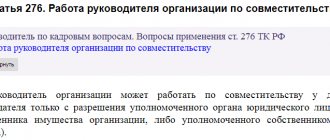What are the differences between a civil law contract (CLA) and an employment contract?
The rights and obligations of the parties under these two documents are governed by different Codes.
The relationship between an employee and an employer is formalized by an employment contract and is regulated by the Labor Code of the Russian Federation. The relationship between the contractor and the customer is prescribed in the GPC agreement and is regulated by civil legislation (Civil Code of the Russian Federation). As you can see, the parties in different contracts are called differently, and this is not accidental. The text of the GPC agreement should not contain labor law terms. Read on topic:
A staff accountant on maternity leave suffered due to a GPC agreement
The employment contract is more stable. The interaction between employee and employer is more stable and thorough. The employee is obliged to perform his duties on certain days and hours in accordance with the job description, and the employer is obliged to pay wages on certain days. That is, an employment contract provides for a whole range of obligations of the parties to each other.
Read on topic:
The Constitutional Court of the Russian Federation prohibited manipulation of fixed-term employment contracts
The GPC agreement contains a minimum of rights and obligations of the parties. The customer pays remuneration to the contractor upon completion of work or services. The contractor is not subject to internal rules, he simply fulfills his obligations under the contract within the agreed time frame.
How to prevent the reclassification of a civil law contract into an employment contract
Several years ago, this was possible only by a court decision - at the request of the individual executor or on the basis of materials sent by the state labor inspectorate or other authorized bodies (persons) (Part 4 of Article 11 of the Labor Code of the Russian Federation).
Law of December 28, 2013 No. 421-FZ introduced Article 19.1 into the Labor Code, according to which cases were added when GPA can be reclassified as labor:
- if a labor inspector discovered a discrepancy and issued an order, and the company did not challenge it in court, it can independently re-register the employment relationship with the employee from civil to labor;
- the same can be done upon a written application from the individual executor;
- It is possible to reclassify civil legal relations into labor relations when such relations have already been terminated only through judicial proceedings.
All irremovable doubts in disputes are interpreted in favor of labor rather than civil law relations.
Employment contract
Basic rules of labor legislation that employees and employers must comply with. According to the employment contract:
- the employee complies with the internal regulations and rules of the organization, works according to the schedule established upon hiring;
- the employee personally performs the work and duties of his regular position;
- an employment contract can be concluded either for an indefinite period or for a period of no more than 5 years (fixed-term employment contract);
- According to the employment contract, the employer is obliged to pay wages at least 2 times a month;
- The employer withholds personal income tax from payments to the employee and pays insurance contributions to the Pension Fund, Compulsory Medical Insurance Fund and Social Insurance Fund.
Financial risks when retraining a civil servant into a labor one
For the amount of remuneration under a civil contract, only contributions for compulsory health insurance, compulsory medical insurance and insurance against industrial accidents and occupational diseases are calculated, if this is expressly provided for in the contract. In case of retraining of the GPD in a labor company, additional compulsory insurance premiums in case of illness due to temporary disability, penalties and fines are threatened.
Inspectors will be able to collect arrears out of court. For example, if the inspection made a decision on recovery as a result of recharacterization of the transaction, and the company did not agree and went to court, but the court recognized this decision as legal (Resolution of the Presidium of the Supreme Arbitration Court of the Russian Federation dated July 16, 2013 No. 3372/13).
The company, if a civil law contract is reclassified as an employment contract, will incur other expenses. She will have to:
- spend money on creating a workplace and providing the employee with everything necessary for work, while the contractor, as a rule, is obliged to provide himself with everything necessary to perform the work (provide services);
- establish a fixed salary as remuneration for work not lower than the federal minimum wage and pay it at least twice a month;
- pay extra for overtime work and work at night, on weekends and holidays, as well as pay all established allowances;
- pay for time not actually worked in cases of failure to comply with labor standards or downtime due to the fault of the employer or for reasons beyond the control of the employer and employee;
- pay severance pay and compensation for unused vacation;
- provide all other guarantees established by the Labor Code: pay annual and educational leaves, sick leave and child benefits, compensate for damages associated with industrial injuries.
In addition, the company may receive less funds:
- in case of compensation for damage that can be recovered from the employee, since in labor relations the amount of compensation is limited to the average monthly earnings;
- in the form of fines, penalties or penalties for poor quality work (provision of services), since such financial liability does not apply within the framework of labor relations.
If a civil contract in fact regulates labor relations, and it is recognized as labor, the employer faces fines (clause 4, article 5.27 of the Code of Administrative Offenses of the Russian Federation):
- from 50,000 rubles to 100,000 rubles for organizations;
- from 10,000 to 20,000 rubles for company officials;
- from 5,000 to 10,000 rubles for individual entrepreneurs.
Civil contract
When concluding a GPC agreement, the customer agrees with the contractor on specific work, services, the deadline for their completion and the price for them. According to this agreement:
- the performer does not obey the internal corporate rules and labor regulations of the organization;
- the customer pays for the result, the payment procedure for work or services is determined by agreement of the parties;
- the customer must withhold personal income tax, pay contributions to the Pension Fund, the Compulsory Medical Insurance Fund, but at the same time he does not pay contributions to the Social Insurance Fund (unless the payment of contributions for injuries is specified in the contract).
Also on topic:
Should employees be instructed on labor safety at the GPD?
Choosing a contract: labor or civil law
In practice, there is a need to distinguish between employment and civil law contracts. The fact is that inspection authorities often do not recognize concluded contracts as civil ones. On this basis, they draw conclusions about understating insurance premiums, avoiding providing certain benefits to employees, reducing the completeness of the tax base for the unified social tax, etc. The fact is that labor and civil law contracts are close in legal regulation: labor relations are inherently adjacent to the obligation to perform work and provide services within the framework of a civil law contract.
In order to determine which contract needs to be used in a particular situation, it is necessary to understand the significant differences between employment and civil law contracts.
The correct distinction between these types of contracts is of significant practical importance, since labor rights and obligations, guarantees of employee rights, which place the employer in rather strict conditions established by labor legislation, apply only to employees under an employment contract. And when drawing up a civil contract, the number of obligations of the employer to the person with whom such an agreement is concluded is significantly less, therefore, the employee is much “cheaper”.
Thus, in order to differentiate the content of the concepts “employment contract” and “civil contract”, it is necessary first of all to conduct a thorough analysis of their definitions.
The concept of “employment contract”
In accordance with Article 56 of the Labor Code of the Russian Federation, an employment contract is understood as an agreement between an employer and an employee, according to which the employer undertakes to provide the employee with work for a specified labor function, to provide working conditions provided for by labor legislation and other regulatory legal acts containing labor law norms, collective contract, agreements, local regulations and this agreement, pay the employee wages on time and in full. In this case, the employee undertakes to personally perform the labor function determined by this agreement and to comply with the internal labor regulations in force for this employer.
An employment contract (Article 67 of the Labor Code of the Russian Federation) is concluded in writing, drawn up in two copies, each of which is signed by the parties. In this case, an employment contract is considered concluded (even if not drawn up in writing) if the employee began work with the knowledge or on behalf of the employer. In this case, the employment contract must be drawn up no later than three days from the date the employee is actually allowed to work. Thus, and in accordance with Article 16 of the Labor Code of the Russian Federation, labor relations “employee - employer” arise regardless of whether an employment contract has been drawn up or not.
As for the direct content of the employment contract, in accordance with Article 57 of the Labor Code of the Russian Federation, it is mandatory for inclusion in the employment contract, in addition to the surname, name, patronymic of the employee, the name of the employer, information about documents identifying the employee and the employer - an individual, the TIN of the employer, the place and dates of conclusion of the employment contract are:
- place of work (if the employee is accepted into a separate structural unit located in another area);
- labor function (work according to the position in accordance with the staffing table, profession, specialty indicating qualifications; specific type of work assigned to the employee);
- start date of work (in the case of concluding a fixed-term employment contract - also its validity period and the basis for concluding a fixed-term employment contract - Article 59 of the Labor Code of the Russian Federation);
- terms of remuneration (including the size of the tariff rate, employee salary, additional payments, allowances and incentive payments);
- working hours and rest hours (if for a given employee it differs from the general rules adopted by a given employer);
- compensation for hard work and work under harmful and (or) dangerous working conditions, indicating the characteristics of working conditions in the workplace;
- conditions that, if necessary, determine the nature of the work (mobile, traveling, on the road, etc.).
Also, the employment contract may provide for conditions on clarification of the place of work, on testing, on non-disclosure of secrets protected by law (state, official, commercial and other), on the employee’s obligation to work after training for no less than the period established by the contract, if the training was carried out at the expense of the employer , on the types and conditions of additional insurance for the employee and other conditions established by labor legislation and other regulatory legal acts containing labor law norms.
The employment contract must contain the following set of details:
- The name of the document is an employment contract.
- Date of creation of the agreement.
- The place of signing is the city.
- Registration number in accordance with the log of registration of contracts (or employment contracts).
- The preamble contains information that allows identifying the parties to the agreement, including specific officials who are authorized to sign this agreement, and the basis documents.
- Text of the agreement.
- Details (data) of the parties. The employer's details must include the TIN.
- Signatures of the parties indicating the position and transcript of the signature. It is obligatory to enter handwritten dates for signing the employment contract.
- Stamp on the details of a legal entity.
- The presence of at least two identical documents transferred to each party.
The approximate form of an employment contract was approved by Resolution of the Ministry of Labor of Russia dated July 14, 1993 No. 135. It can be used both as a basis for developing contracts and as a template, but taking into account the conditions of the new labor legislation and the characteristics of the parties to the contract.
There are also a number of forms developed for certain sectors of activity, for certain categories of workers and employees, as well as for certain regions (for example, the Far North).
The standard form of the employment contract is approved by the head of the organization. When concluding an individual employment contract, it is no longer necessary to enter the “Approved” requisite. When hiring, the text of a standard employment contract is used and adjusted to the conditions of hiring a specific employee.
In order to avoid conflict situations and misunderstandings with employees in the future, it is recommended that the signatures of the parties to the employment contract be placed on each page of the text of the employment contract.
The concept of “civil contract”
The concept of a civil contract is defined in accordance with Article 420 of the Civil Code of the Russian Federation and implies an agreement of two or more persons to establish, change or terminate civil rights and obligations. The terms of such an agreement are determined at the discretion of the parties, except in cases where the content of the relevant condition is prescribed by law or other legal acts (Article 421 of the Civil Code of the Russian Federation).
At the same time, in the process of executing a civil contract, it is necessary to keep records of the volume of work (services) and the time of their completion (rendering). The intermediate and (or) final result of the work (service) must be determined in a bilateral act, based on the accounting form established by the contract (weight moved, time spent on providing the service, quantity of goods sold, etc.). Settlements under these agreements must be made based on the results reflected in the bilateral act.
The difference between employment and civil law contracts
So, some organizations often confuse in practice or deliberately try to “replace” an employment contract with a civil contract. Here it is necessary to remember that if it is established in court that a civil contract actually regulates labor relations between an employee and an employer, the provisions of labor legislation apply to such relations (Article 11 of the Labor Code of the Russian Federation). A similar opinion was expressed by the judges in paragraph 3 of paragraph 8 of the resolution of the Plenum of the Supreme Court of the Russian Federation of March 17, 2004 No. 2.
Example 1
You cannot hire a receptionist, call the contract concluded with him a contract and, on this basis, not provide him with social guarantees. The reception secretary belongs to the staff of the organization, his work does not have an end result, he follows the mandatory instructions of officials regarding his work activities, and is subject to internal labor regulations. When considering this agreement in a judicial dispute, according to the indicated criteria, it will be classified as an employment contract with all the ensuing consequences.
In order for the employer to more clearly understand all the hidden dangers when concluding both employment and civil contracts, we present the practical difference in Table 1 between an employment contract and civil contracts (using the example of three types of contracts).
Comparison of employment and civil law contracts
| Employment contract | Civil contract | ||
| Work agreement | Agency agreement | Contract for paid services | |
| 1 | 2 | 3 | 4 |
| 1. Basic regulations governing contracts | |||
| Chapters 10-13 of the Labor Code of the Russian Federation | Chapter 37 of the Civil Code of the Russian Federation | Chapter 49 of the Civil Code of the Russian Federation | Chapter 39 of the Civil Code of the Russian Federation |
| 2. Name of the parties | |||
| Employee and Employer | Contractor and Customer | Attorney and Principal | Contractor and Customer |
| 3. Subject of the agreement | |||
| The contract regulates the labor process, the process of performing work and providing services. | The contract regulates the achievement and transfer of the result of labor to the Customer | The contract regulates the achievement and transfer of the result of labor to the Principal. | The contract regulates the achievement and transfer of the result of labor to the Customer. |
| 4. Nature of the work performed | |||
| The employee performs any work assigned to him in a specific specialty, qualification or position. | Manufacturing, processing, processing of an item by a contractor, other work with the transfer of its result to the Customer. | Performing by an attorney on behalf and at the expense of the principal certain legal actions. | Providing services, performing a certain action, carrying out a certain activity. |
| Example 2 A secretary working in an organization is obliged to perform all work related to the organization of office work, keep records of documents entering and leaving the organization, correctly draw up documentation, print individual documents at the request of the manager, receive visitors, answer telephone calls, and perform other tasks. employer's instructions. | Example 3 A person working under a contract assumes the responsibility to print 100 documents within a week according to the Customer’s instructions. The rest of the work related to registration and distribution of these documents to recipients will be carried out by the Customer independently. | Example 4 A person working under a contract of agency participates as a defense attorney in criminal proceedings. | Example 5 A person working under a contract for the provision of services undertakes the obligation to provide information and consulting services, for example, holding a seminar with a specific lecturer. |
| 5. Relationship between the rights and obligations of the parties | |||
| Submission of the Employee and the Employer (represented by the organization’s administration) to the internal labor regulations. | The rights and obligations of the Customer and the Contractor are determined by agreement (contract). | The rights and obligations of the Attorney and the Principal are determined by agreement (contract). | The rights and obligations of the Customer and the Contractor are determined by agreement (contract). |
| 6. Settlements under contracts | |||
| Payment is made not based on the results of the work, but for its process in the form of regular payments, conditioned by the arrival of the next payment deadline. The employee receives wages and social benefits. | Payment is made based on the results of the work performed, as a rule, after signing the acceptance certificate for the work performed. | Remuneration may or may not be provided for in the contract. | The term and procedure for payment for the Contractor’s services are determined by the agreement (contract). |
| 7. Duration of the contract | |||
The agreement can be concluded:
| The contract is concluded for a certain period (the period of completion of the work). The contract specifies the start and end dates. | The contract is concluded for a certain period (the period of completion of the work). The contract specifies the start and end dates. | The contract is concluded for a certain period (the period of completion of the work). The contract specifies the start and end dates. |
| 8. Subordination of the parties, compliance with the work schedule (schedule), labor discipline | |||
| The employee carries out the orders of the organization’s administration, observes labor discipline, and is on the organization’s staff. | The contractor is not included in the staff; he performs the work at his own expense and independently. | The attorney is not included in the staff; he works according to the instructions of the principal. | The contractor usually provides services in person. Not included in the staff. |
| 9. Organization of work, assistance in fulfilling obligations | |||
| The administration of the organization is obliged to ensure the working conditions provided for in the labor and (or) collective agreement with the Employee. | The Customer may provide assistance to the Contractor in performing the work, including free of charge. | The Principal may reimburse the Attorney's expenses and provide the necessary funds. | The Customer may reimburse expenses actually incurred by the Contractor if it is impossible to fulfill the contract on previously reached conditions. |
| 10. Risk of accidental loss of labor results | |||
| The risk of accidental loss of results lies with the Employer. | The risk of accidental death before the transfer of the results of work to the Customer lies with the Contractor. | There may be no results of labor. The procedure for compensation for losses is determined by agreement of the parties and is fixed in the contract. | There may be no results of labor. The procedure for compensation for losses is determined by agreement of the parties and is fixed in the contract. |
| 11. Accounting for experience and earnings, provision of benefits | |||
| Work experience and earnings are taken into account when assigning a pension and determining unemployment benefits. The employee is provided with annual basic (and additional) paid leave, paid for time of incapacity for work, reimbursed expenses associated with business trips, paid severance pay, etc. | The duration of the contract is included in the total length of service, remuneration is taken into account as part of earnings, from which pension and unemployment benefits are calculated. Vacation is not provided, time of incapacity is not paid. | The duration of the contract is included in the total length of service; remuneration is taken into account as part of the earnings from which the pension is calculated, but is not taken into account when assigning unemployment benefits. Vacation is not provided, time of incapacity is not paid. | The duration of the contract is included in the total length of service; remuneration is taken into account as part of earnings, from which pension and unemployment benefits are calculated. Vacation is not provided, time of incapacity is not paid. |
| 12. Termination of the contract (unilaterally) | |||
| Unilaterally only on the part of the Employee, and in cases provided for in Article 81 of the Labor Code of the Russian Federation, by the Employer. | Possibly unilaterally, both on the part of the Contractor and on the part of the Customer. | Possibly unilaterally both on the part of the Attorney and on the part of the Principal. | Possibly unilaterally, both on the part of the Contractor and on the part of the Customer. |
| 13. Dispute resolution | |||
| Disputes are considered by the Labor Dispute Commission and a court of general jurisdiction. The Labor Code of the Russian Federation does not contain provisions on mandatory preliminary out-of-court resolution of a labor dispute by the Labor Dispute Commission, therefore the Employee has the right to immediately go to court for its resolution. | Disputes arising from the contract are considered by a court of general jurisdiction. | Disputes arising from the agency agreement are considered by a court of general jurisdiction. | Disputes arising from a contract for the provision of paid services are considered by a court of general jurisdiction. |
Judicial practice also shows that there is a very high danger of recognizing a civil law contract as an employment contract. Therefore, the characteristics of these types of contracts should be taken into account, strictly observing the legislation of the Russian Federation regulating this problem.
As evidence of the stated point of view, one can also cite the fact that the tax authorities have the right to prove in court the actual content of contracts concluded by an organization with persons involved in the current activities of the company. Consequently, the distinction between the concepts of labor and civil law contracts is of significant importance for tax authorities, especially in terms of the completeness of the organization’s determination of the tax base for the unified social tax (Articles 31, 33 of the Tax Code of the Russian Federation).
Also, when analyzing the real relationships between the parties that develop during the performance of work under an employment or civil law contract, it should be noted that in accordance with the explanations of the Federal Insurance Service of the Russian Federation (letter dated May 20, 1997 No. 051/160-97), the insured is obliged to accrue insurance contributions to the Federal Social Insurance Fund of the Russian Federation for the entire amount of remuneration for all reasons, with the exception of certain amounts, which include remuneration paid under civil law contracts. In accordance with inspections carried out by the Social Insurance Fund of the Russian Federation, it was discovered that the incomplete accrual of insurance contributions to the wage fund is often explained by the administration of organizations (enterprises, institutions) by the presence of written agreements with employees, which are mistakenly considered civil contracts.
Judicial and arbitration practice
The court pointed out the following signs that make it possible to distinguish an employment contract from civil law contracts. Carrying out work under an employment contract presupposes the inclusion of the employee in the production activities of the company. In addition, the employment contract provides for the employee’s subordination to internal labor regulations; its component element is the implementation of the employer’s orders during the labor process, for improper implementation of which the employee may be subject to disciplinary liability. According to the employment contract, the employee performs work of a certain type, and not a one-time task from the customer. When performing a labor function under an employment contract, the employee is provided with social guarantees and compensation (resolution of the Federal Antimonopoly Service of the East Siberian District dated July 11, 2006 No. A33-19664/05-F02-2961/06-S1 in case No. A33-19664/05)
Judicial and arbitration practice
According to the Federal Tax Service, civil contracts concluded by an organization with individuals cannot be recognized as civil contracts and fully relate to employment contracts, since these persons performed a certain function under the concluded contracts.
Recognizing the position of the Federal Tax Service as unlawful, the court stated the following. The contracts with these performers did not contain contract terms, the absence of which indicates that the employment contract was not concluded.
The hiring of these persons was not formalized by orders, and work books were not issued. The work does not correspond to a certain specialty, qualification, position, the specified work performers did not obey the internal labor regulations. The terms of the contract did not define the terms of payment, but determined a fixed monetary amount.
Thus, the inclusion in contracts of an organization with individuals of conditions on compliance by performers with labor protection requirements, hygiene, industrial sanitation, conditions on financial liability does not change the civil law nature of the contracts; the organization’s obligation to ensure the safety of work remains in the case of hiring workers to perform work on the basis of civil contracts (resolution of the Federal Antimonopoly Service of the Moscow District dated August 16, 2006 No. KA-A41/7668-06).
Judicial and arbitration practice
The tax authority believed that the amount of compensation for the cost of travel tickets when hiring under a work contract should be included in the income of an individual, since in accordance with Article 169 of the Labor Code of the Russian Federation, expenses when moving to work in another area are subject to reimbursement only when hiring under an employment contract . In this regard, the court indicated that reimbursement of expenses for moving to the place of work is recognized as compensation in the presence of an employment relationship. If work is performed under a civil contract, the amount of such compensation is the income of an individual and is subject to taxation (resolution of the Federal Antimonopoly Service of the North-Western District dated May 5, 2006 in case No. A21-9905/2005).
* * *
Thus, in order to protect the interests of employers, it should be noted that since the need for a clear distinction between an employment contract and a related civil law contract arises everywhere and has global significance not only in the employer’s relations with employees, but also when calculating mandatory payments to the state treasury ( taxes, insurance premiums, etc.), this problem should be solved locally through a thorough analysis of the real relationships between the parties that develop during the execution of work, which should be reflected in such contracts.
Authors:
Sorokina O.S. , Deputy Director of Professional Development Center LLC
Bespalova V.V. , Leading specialist on military registration and personnel records management of the Department of Labor Law of Subscriber Service Center LLC







